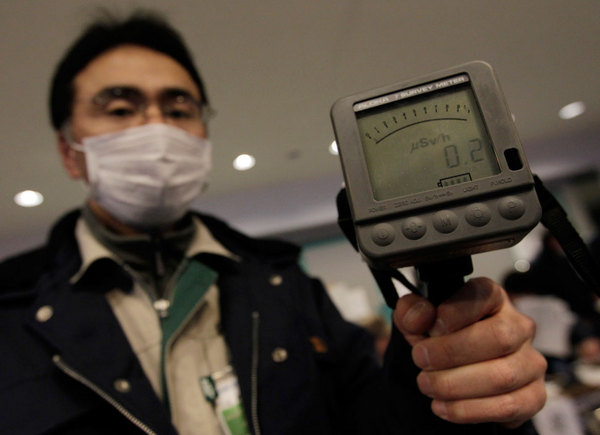 PHOTO: An employee of Yamagata city office holds a Geiger counter to detect radiation when evacuees from the vicinity of Fukushima nuclear plant wish to be screened upon their arrival at an evacuation center set in a gymnasium in Yamagata, northern Japan March 19, 2011, eight days after Japan's devastating earthquake and tsunami. REUTERS/Yuriko Nakao.
PHOTO: An employee of Yamagata city office holds a Geiger counter to detect radiation when evacuees from the vicinity of Fukushima nuclear plant wish to be screened upon their arrival at an evacuation center set in a gymnasium in Yamagata, northern Japan March 19, 2011, eight days after Japan's devastating earthquake and tsunami. REUTERS/Yuriko Nakao.
Steve Herman at Voice of America reports that Japan's chief government spokesman said today 'elevated levels of radiation have been found in milk and spinach near the crippled nuclear power plant in Fukushima prefecture.'
While the levels are higher than government safety standards, the tested food does not immediately pose a health risk, according to officials. But this is the first time radiation has been detected in food since the March 11 earthquake and tsunami triggered the nuclear crisis. More at VOA, here.
In that same press conference, government spokesperson Yukio Edano said conditions at the plant's No. 3 reactor unit, which were of greatest concern, have probably become more stable after 'firefighters threw some 60 tons of water at a boiling spent fuel pool there shortly after midnight from outside the damaged building housing it.'
Separately, Defense Minister Toshimi Kitazawa said surface temperatures at the No. 1 to No. 4 reactors were found in the morning to be '100º C or lower by a Self-Defense Force helicopter,' and that their state is more stable than expected. More at Kyodo News.
Related, NHK reports:
Gakushuin University Professor Yasuyuki Muramatsu says it was predicted that high levels of iodine and other radioactive substances would be detected in spinach and other leafy vegetables, as well as grass. He says washing vegetables thoroughly will help to remove the radioactivity to some extent. Muramatsu says consumers should not eat the spinach as the detected levels of radiation are well above the legal limit.
Japanese officials today say radioactive iodine above the government-recommended threshold have been measured in the drinking water in Fukushima prefecture, where the plant is located.
And on the official Twitter stream of the Prime Minister's office today, advice on how to avoid radioactive rain. Yes, that is what I just typed.
It's possible that rain can contain a small amount of radioactive substances when it rains in Tohoku and Kanto regions. Even if you are exposed to rain, it doesn't impose any threat on health. If you are concerned, follow these instructions.
1) Try not to go out unless it is an emergency.
2) Make sure of covering up hair and skin as much as possible
3) In case your clothes or skin is exposed to rain, wash it carefully with running water.
Small traces of new radioactivity have also been measured in tapwater in Tokyo and surrounding areas, but consensus at this time is that the levels do not pose an immediate public health threat.
While the substance was found in Tochigi, Gunma, Niigata, Chiba and Saitama prefectures as well as Tokyo, traces of cesium have also been found in tap water in two of them -- Tochigi and Gunma, the Ministry of Education, Culture, Sports, Science and Technology said, adding their levels do not affect human health even if they are taken in.
Among them, Tochigi, Gunma and Niigata border Fukushima Prefecture.
In Maebashi, Gunma, 2.5 becquerels of iodine and 0.38 becquerel of cesium were detected Friday per kilogram of water, the prefectural government said, adding it is the first time the substances were found since it began testing tap water for radioactive materials in 1990.
More at Kyodo News.
Update: A New York Times piece on the news of contaminated produce and dairy products in Japan is now live.

No comments:
Post a Comment